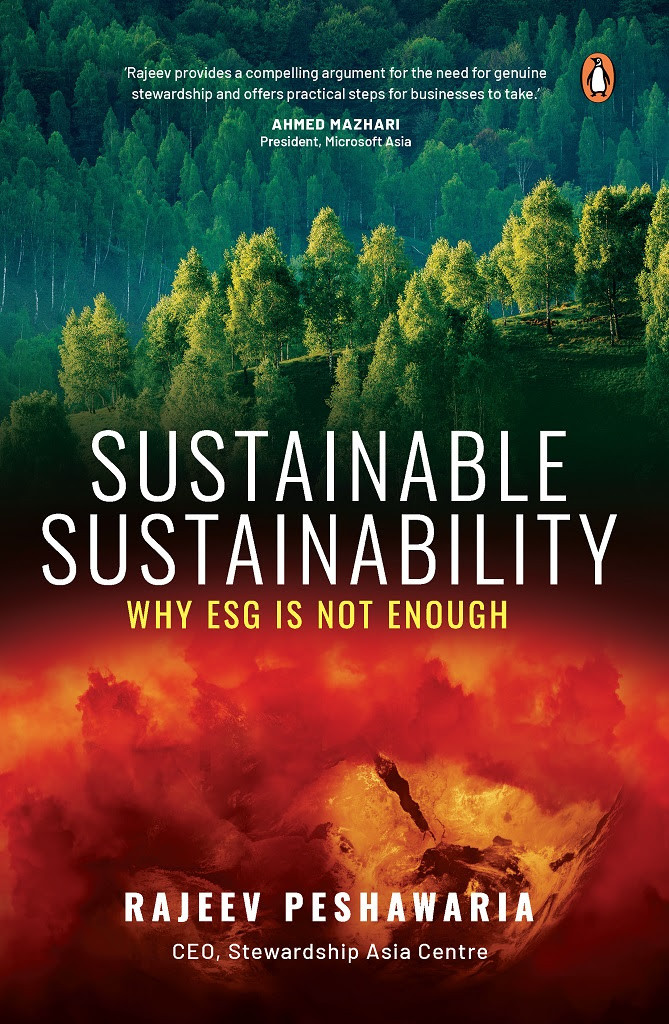Popular Reads
Top Results
Can't find what you're looking for?
View all search resultsPopular Reads
Top Results
Can't find what you're looking for?
View all search resultsUntangling ESG and its unintended effects
Change text size
Gift Premium Articles
to Anyone
A
s public conceptions evolve with the ever-changing economic landscape, corporations are slowly moving away from traditional business models and corporate policies to embrace more sustainable strategies that enable long-term prosperity.
Some of these practices are also designed to fulfill a company’s corporate social responsibility, based on an understanding that consumers are more attracted to businesses that score higher with regard to environmental, social and governance (ESG) standards.
However, in a world where the word “sustainability” has been thrown around, often as a buzzword without any actionable policies and impact, many people might find the concept hard to understand, let alone integrate it into their daily activities.
To untangle the web of greenwashing and learn what sustainability is, we need to fully understand the concept.
According to the United Nations Brundtland Commission, which defined the word in 1987, sustainability is “meeting the needs of the present without compromising the ability of future generations to meet their own needs”.
The UN has also provided a guideline with the 17 Sustainable Development Goals (SDGs), created in 2012.
To help companies adhere to these guidelines and integrate sustainable practices into their daily operations, Rajeev Peshawaria, CEO of the nonprofit Stewardship Asia Centre (SAC), wrote Sustainable Sustainability: Why ESG Is Not Enough.
Published in November 2023 by Penguin Random House, Peshawaria draws from his experience of more than 30 years at several global brands to explain why businesses need to reach beyond ESG.
“The book was born out of curiosity and a huge amount of worry that even though everyone is singing the sustainability song these days, we are not making enough progress on issues like climate change or inequality.
He cited some incredible numbers: as many as 50,000 species are going extinct every year, and around 1.7 Earths are needed to support the current levels of human consumption.
A rapidly evolving technology landscape has also created other issues. For example, cybercrime is now more profitable than the drug trade, and a cyberattack happens every 39 seconds.
A fact that will resonate with many is that the richest 1 percent own twice the collective wealth of the 6.9 billion other people in the world.
Identifying ‘missing link’
“We wanted to find out why, despite trillions of dollars invested in ESG funds and a plethora of regulations and incentives, we are going in the opposite direction. This book is about the missing link,” Peshawaria explained.
“After studying global organisations that are doing well by doing good, we learned that champions of the environment and society see themselves as stewards of planet Earth and humanity. They proactively choose to create sustainability-first strategies that align profit with purpose. These champions are steward leaders,” he explained further.
In Sustainable Sustainability, Peshawaria argues that the ESG framework has relied on incentives and regulations - the same tools that caused the excesses of shareholder capitalism - to drive responsible behavior.
Explaining this further, he said incentives created tick-the-box behavior, and regulations have been routinely bypassed through clever loopholes, leading to the widespread corporate phenomenon of greenwashing.
“Incentives and regulations are important, but over-relying on them is not. What we need, in addition, is the spirit of steward leadership,” he said.
“Steward leaders don’t wait for regulation or incentives to do the right thing. They believe in values like interdependence, the belief that the more I give, the more I will get; long-term view, that in the long run, doing the right thing will make me more successful; ownership mentality, proactively create positive environmental and social impact; and creative resilience, having the tenacity to not give up on innovation despite multiple failures,” Peshawaria said.
“So I think what we need to do in addition to having incentives and regulation is to spread knowledge of steward leadership and get people to adopt steward leadership proactively. And then, magic will happen,” he added.
Steward leadership, in its simplest form, is the genuine desire and persistence to create a collective better future for stakeholders, society, generations and the environment. Steward leaders choose to build a strong legacy of creating shared prosperity, rather than pursue their personal ambitions for success and those of a selected group of stakeholders.
It is important to note that steward leadership is not opposed to profit. Instead, it is about generating profitable solutions for the biggest pain points of humanity today.
Thus, such leaders see themselves as stewards of our planet and everyone on it, and are willing to struggle to find the innovations needed to marry purpose and profit.
“We talked to 100 companies that are actually making a difference while making money for shareholders, and we found that the missing link, based on that research, was steward leadership,” Peshawaria revealed.
For the last 14 years, Peshawaria has been helping as many companies as possible to improve their leadership in achieving sustainability goals.
Avoiding traps
“Let's get one thing straight: There is absolutely no tension between purpose and profit in the long run. The key is to curb short-term, get-rich-quick greed. Once we think long-term, there is no tension between purpose and profit,” he continued.
“Companies that have thrived for hundreds of years have done so by taking this long-term view that the more we focus on our environmental and social sustainability, the more our business is going to grow.”
Peshawaria acknowledged that steward leadership is counterintuitive to most.
For instance, humans don’t naturally think about interdependence first and instead prioritize how much they can get from the world over how much they can give to the world. This sort of behavior leads to thinking about how fast they can check the boxes to gain easy ESG points.
Peshawaria advised consumers to pressure greenwashing companies to change their behavior by doing two things: shun their products, and self-educate.
“In the recent UNICEF survey that I saw, there was a simple question, what is climate change, and there were two choices in the multiple-choice question,” he recounted.
“The first choice A was something like: seasonal weather changes that happen every year spring, summer or winter. And B [was] massive global warming causing the polar ice caps to melt and creating huge biodiversity loss and extreme weather situations harming society.”
After a brief pause, he said: “53 percent of the people chose A.”
According to Peshawaria, the answer reflects a need for consumers to educate themselves, whether on the brands they buy or sustainability as a whole. As the first step, his advice is for people to pay attention to various media each day and keep their eyes and ears open to new information.
The world’s greatest existential challenges today are climate change, socioeconomic inequality and cyber vulnerability, he said, and the way to address them is through education.
“So just keeping your eyes and ears open, you will get plenty of information as to who is a ‘green washer’ and who's not,” he said.
“There's just a simple example: You go to the grocery store to buy groceries, and there are all kinds of claims that these are green. But people don't read carefully as to what the ingredients are. So just use your head.”
Different landscapes
From his experience working in several parts of the globe, Peshawaria noted that awareness about sustainability varied depending on the level of economic development. The importance given to sustainability also varied, depending on local living standards.
So, in countries with very low incomes and education levels and countries torn by geopolitical unrest, sustainability would not top the agenda.
As for Indonesia, it was more preoccupied with its massive population, massive unemployment and lack of a fully educated society, though Peshawaria conceded that socioeconomic problems sometimes took precedence over a country’s sustainability stance.
To encourage inspired followership, according to him, leaders everywhere needed to do the same things: Make people believe in a purpose greater than themselves, treat people with respect, and empower them to do their best.
Leaders also should not shy away from making tough decisions, but they should do so with empathy.
“What we expect from our leaders to bring out the best in us is the same, whether we are in Indonesia, [...] in the United Kingdom or the United States,” he said.
Peshawaria said he had maintained the same leadership style and upheld his principles throughout his career. Writing Sustainable Sustainability reinforced his thinking and belief that leadership is not about a position or a title but about what an individual does to their followers.
“It is about the amount of energy you can garner from within yourself to create a collective, better future. So my views actually got further and strengthened by writing this book,” he said.
“However, in my previous book, there was a slight difference in how we defined leadership. In my previous books, we said leadership is the genuine desire and persistence to create a better future. In this book, we say, ‘No, not just a better future, but a collective better future’.”
Peshawaria’s previous best-selling titles include Open Source Leadership (2017) and Too Many Bosses, Too Few Leaders (2011). He also co-wrote Be the Change (2014).
Specifically, regarding sustainability, he expressed a wish that readers would take the first two steps toward steward leadership without worrying about clarity or the next 98 steps because the path would become more apparent day by day.
In partnership with Stewardship Asia Centre











